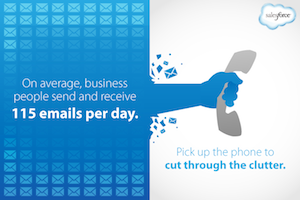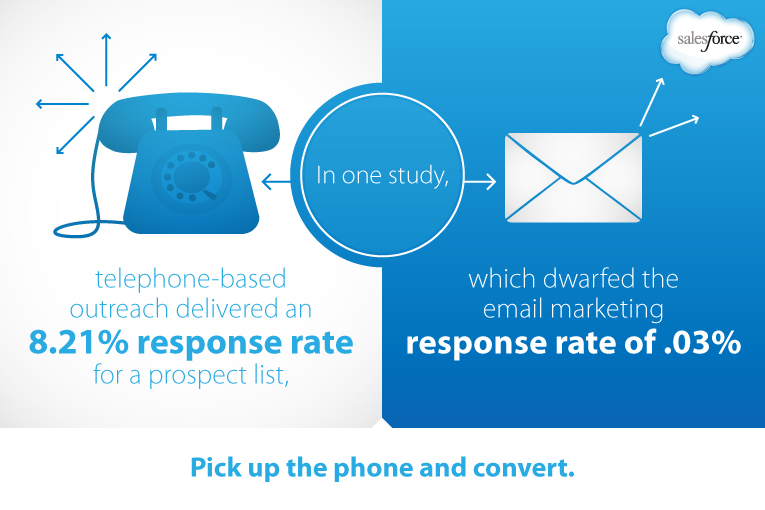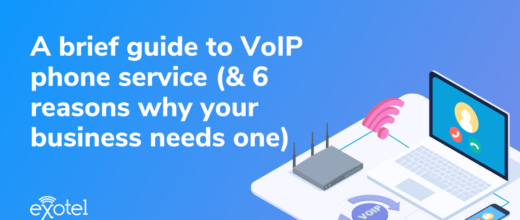Some quick data on Telephone communication to put things in perspective
- Data suggests, with the growth of mobile, inbound sales calls will double from 30 billion to 60 billion in 3 years (source: Kelsey)
- In fact 61% of all mobile searches where a customer contacts a business it is via a phone call
- There are 30 billion inbound sales calls every year. Just. Sales. Calls. Inbound. That number is projected to GROW to 70 billion by 2016!
- 61% of mobile searches in which a customer contacted a vendor, a phone call was generated. Sixty. One. Percent.
- Call centers provide conversion rates of 10x to 20x that of online shopping and also 1.5x to 2x the average order value.
I work with Exotel. We communicate with our customers via Calls, SMSes, Emails, Intercom messages, Ticketing system, Whatsapp Twitter, Facebook, Linkedin and what not. There came a time, when practically were obsessed with responding to everything real-time. We started hurrying conversations and it was affecting the quality of our conversation. Our Sales Team realized the importance of quality over quantity soon and swore to focus on the live conversations at hand, rather than parallel conversations on the smartphone screen.
But the bigger problem is that there are just too many parallel live conversations, period. This is especially true when people are trying to resolve a conflict or communicate an important business decision. There is a rising and unproductive trend towards people trying to do digital conflict resolution. This phenomenon seems to be increasingly via email, especially with emails becoming more and more common as internet penetration grows. More accurately, email has become a convenient mechanism for issue-avoidance. It is easier, quicker, less stressful, and less confrontational to have critical or challenging issues sent over email versus a live one-on-one with a counterpart.
I used to love emails. As we got bigger, emails started becoming more and more inefficient. People wouldn’t reply to my emails anymore. Then, one day, I got an email from someone who was interested in using Exotel but had issues with our payment model. I tried to convince him about the system we were using and he tried to tell me why we needed to change it. This went on for about 15 emails back and forth (not very pleasant ones) and then I just couldn’t type anymore. So I picked up the phone and called him up. In 4 minutes, I was able to get him to see my point of view.
What 15 emails couldn’t do, happened in a one 4-min conversation.
That is when I understood the power of phone support for business. Now, all of us at Exotel understand this very well. The reason why I now prefer to just get on a call and do business is because:
1) Issues get dealt with faster
One of the main reasons why picking up the phone and calling someone is better than sending an email, is the fact that any issue can be dealt with faster and more efficiently. Emails often land in a clogged inbox and remain unopened or not-actioned until after the date that any action needed to be taken has passed. On a call, all the information can be relayed and answers or conclusions can be reached and actioned there and then, without having to wait for replies.
2) Less room for misunderstanding
Another key reason why a phone call is better than an email is that key information and content can remain in context, whereas misunderstandings can often occur in emails. If the subject matter of a conversation is of a complicated, technical or particularly sensitive nature, an email can often lead to unnecessary confusion and misunderstanding, leading to long and drawn out email exchanges. Simply picking up the telephone and dialling those that need to be involved can eliminate any room for misunderstanding. (e.g – Think about your last argument with your better half :P)
3) All participants involved can bring in inputs real-time
Phone calls have another advantage over emails when it comes to multiple participants or recipients in a conversation. If the subject matter involves numerous people and needs input from different parties, a conference call works much better than those long email exchanges. In emails, crossed wires, time delays, and diary clashes can prevent all participants being involved in the conversation in a timely manner. However, conference calls allow all those people to hear the same information at the same time, and participate in the conversation on an even keel.
4) No need for lengthy email threads
Following on from the above, a further reason why a call is better than an email is because of the format in which the conversation takes place. If the subject requires a long conversation, involving questions and answers, back and forth between two or parties, an email exchange soon takes up valuable time, and effort, whereas the equivalent conversation over the phone will take less time, effort, and be more convenient and efficient in business terms. For our Sales team, this was particularly relevant.
5) Builds relationships
Concepts such as B2B and B2C are moving more and more towards H2H business processes(human to human). Phoning colleagues, partners, suppliers, customers, and contacts can prove much more effective in terms of relationship building, networking, and maintaining quality communication streams between all parties. Email can become incredibly impersonal and picking up the phone can add a human element to an otherwise faceless, soulless exchange.
Writing emails is tricky. Especially, if you’re not the business communication types. I find phone calls much better. 🙂
Here’s why







 +91-8088919888
+91-8088919888 +61-2-8073-0559
+61-2-8073-0559 +62-215-098-4960
+62-215-098-4960 +60-3-2771-2799
+60-3-2771-2799 +65-6951-5460
+65-6951-5460